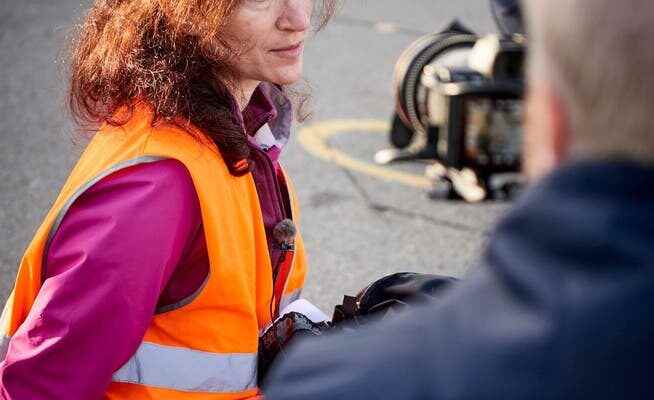Activists from Renovate Switzerland have been blocking roads across the country for over a week. However, the public focus is on a single person: Julia Steinberger, professor and activist.
“It’s possible to do research and be arrested and possibly charged as an activist.” Julia Steinberger, Professor.
On Friday, supporters of the Renovate Switzerland campaign blocked a busy street in Zurich. It was the sixth action within ten days in Switzerland. As in the days before, the sympathizers act according to a fixed pattern. They wear orange high-vis vests, sit down, hold up placards, cause a traffic jam. They wait stoically for the police to carry them off the street and arrest them. Then the campaign is over and what the sympathizers actually want begins: people start tweeting, discussing, getting upset.
To a certain extent, all this fuss is calculated. “Getting into good trouble” is what activists like Julia Steinberger call it. They hope that this will get the general public thinking. This Wednesday, Steinberger taped her hand to a Bernese highway exit, like other Renovate Switzerland activists. But she became the face of the action. Because she is a university professor.
With their action, Renovate Switzerland and Julia Steinberger called for an offensive in the renovation of buildings in Switzerland. Buildings account for 45 percent of energy consumption in Switzerland. Only traffic causes more CO2-Emissions. That is why Renovate Switzerland wants the Federal Council to immediately provide CHF 4 billion so that 100,000 people can undergo retraining to work in the construction sector.
Bourgeois politicians sharply criticized Steinberger for their action on Wednesday. You think such behavior is not appropriate for a professor. She herself sees things differently.
How is it that a professor from the University of Lausanne ends up on the street?
And why don’t we?
Julia Steinberger says that she has known for twenty years that climate change is a serious problem. At that time she was not doing research on this topic. She believed that people would become aware of this problem and then solve it. A few years ago she came to the conclusion that she had to do her own research on climate change.
In April 2022, scientists from the Intergovernmental Panel of Climate Experts (IPCC) published a report calling on governments worldwide to invest in decarbonization. The report warns of the impending collapse of human civilization, and the UN has underscored the urgency. Julia Steinberger co-wrote the report.
She says she will continue to conduct research, engage in academic-level discussions and engage directly with politicians. She is now convinced that she must not only do research, but become even more active.
In her research, Steinberger dealt with a central question: Is it possible to ensure a good standard of living and at the same time reduce energy consumption? According to Steinberger’s research results, this would be feasible. She researched further and asked herself: And why don’t we do it?
Professor Steinberger says her research made her a climate activist.
She already has a lawyer
The question of whether academic work and activism are compatible is not new. Steinberger studied at the renowned Massachusetts Institute of Technology in America experienced how their professors actively opposed the Iraq war and were therefore publicly attacked. As a professor in England, she saw students abandon their research because they were activists and feared for their jobs.
With her campaign, Steinberger wants to send a signal to young students: “It is possible to do research and be arrested and possibly charged as an activist.”
Steinberger’s employer, the University of Lausanne, has also dealt with this question. This spring, a university working group submitted a corresponding report. The bottom line is: University employees may use means of protest such as civil disobedience, but must be aware of the legal consequences.
Julia Steinberger is aware of this. She already has a lawyer. She needed him for the legal aftermath of a previous action.
